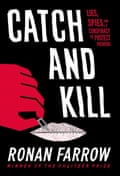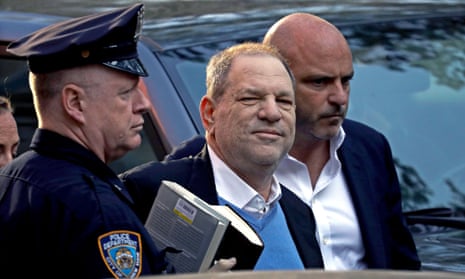The combination of rage, threats, professional promises and vulnerability that Harvey Weinstein used to secure the silence of women he allegedly sexually attacked is described in a newly disclosed interview between one of his accusers and Ronan Farrow, the journalist who exposed the Hollywood mogul.
In his new book Catch and Kill chronicling his investigation into Weinstein, Farrow relates for the first time details of his conversation with a longtime former employee of the movie producer, Alexandra Canosa.
Conducted in 2017 while Farrow was still working for NBC, the hitherto unreported interview gives an insight into the range of emotions and pressures that Weinstein exerted to avoid being held accountable for his alleged sexual crimes.
“He creates the situation in which your silence will benefit you more than speaking out will,” Canosa told Farrow, referring to her former boss.

Farrow spoke to the Guardian’s Weekend magazine about the extraordinary lengths to which he had to go to chase down the Weinstein story, the seminal trigger of the #MeToo movement. He also addresses the remarkable steps that were taken by Weinstein and his legal team to try to throw him off the scent, including dispatching private eyes to trail him clandestinely and using his family connections as the son of Mia Farrow and Woody Allen against him.
“You start to realise that if you are wealthy enough and connected enough, you can hire secret agents with false identities, and honeypots to go after and try to seduce people, and engage in cyberhacking to try to track someone’s location,” Farrow said. “This is a whole underbelly of what the wealthy and powerful do if they are in a corner.”
Weinstein is on bail awaiting a January trial for predatory sexual assault, criminal sexual act in the first degree, first-degree rape and third-degree rape. He has pleaded not guilty to all charges, and has denied all allegations of non-consensual sex raised against him by more than 80 women.
In his book, Farrow, who won a Pulitzer prize for his reporting on Weinstein along with Jodi Kantor and Megan Twohey of the New York Times, makes other devastating allegations about separate #MeToo targets. He discloses that a former NBC News employee, Brooke Nevils, accused Matt Lauer, NBC’s towering star on the morning Today show until his downfall in November 2017, of raping her at the Sochi Olympics in 2014.
Lauer has denied the allegation as “categorically false”.
Catch and Kill recounts how Canosa met Weinstein for the first time at Soho House in Hollywood when she worked as an event planner. In a meeting soon afterwards he took her to a hotel suite where he beguiled her with the prospect of a career as a movie actor before asking her to kiss him; she said no.
In a later encounter he said he wanted her to be his collaborator on a biopic about the jazz and blues singer Eva Cassidy. It was during discussions about that exciting prospect that Weinstein took Canosa to his hotel room and asked her to take a shower with him; she declined again but to her distress he proceeded to masturbate while she was in the next room.
The carrot he dangled in front of her of industry rewards was coupled on other occasions with the stick of displays of anger, foul language and crying. Farrow writes that Canosa told him Weinstein began weeping after news broke that his film company Miramax was being sold by Disney.
“Don’t fucking refuse me when I’m crying,” the movie producer was said to have roared at her.
Farrow recalls that Canosa told him that Weinstein had gone on to rape her. Despite the alleged attack she kept in touch with him and began to work formally for his company, with a role on the Netflix series Marco Polo, of which he was executive producer.
She held back from doing something about the alleged abuse she witnessed, both personally and against others, because she feared his wrath. “The number of times I’ve seen people have their lives threatened, or their wives threatened, or their reputation threatened,” she said in the Farrow interview, according to his book.
Farrow in the end did not tell the Weinstein story through NBC. He claims that the network ordered him off the story partly under pressure from Weinstein (the network denies that), forcing him to take his work to the New Yorker, where his first explosive article ran on 10 October 2017.
Two months later, Canosa lodged a lawsuit against Weinstein and his company in which she alleged 11 incidents of rape, physical assault and verbal bullying over many years. The lawsuit said that Weinstein had made it clear that if she rejected his advances or told anybody about unwanted behavior “there would be retaliation, including humiliation, the loss of her job and loss of any ability to work in the entertainment business”.
At the time the lawsuit was disclosed, Weinstein said through his lawyers that Canosa was someone he had thought of as “a good friend”. He said her allegations were “deeply upsetting” to him.
